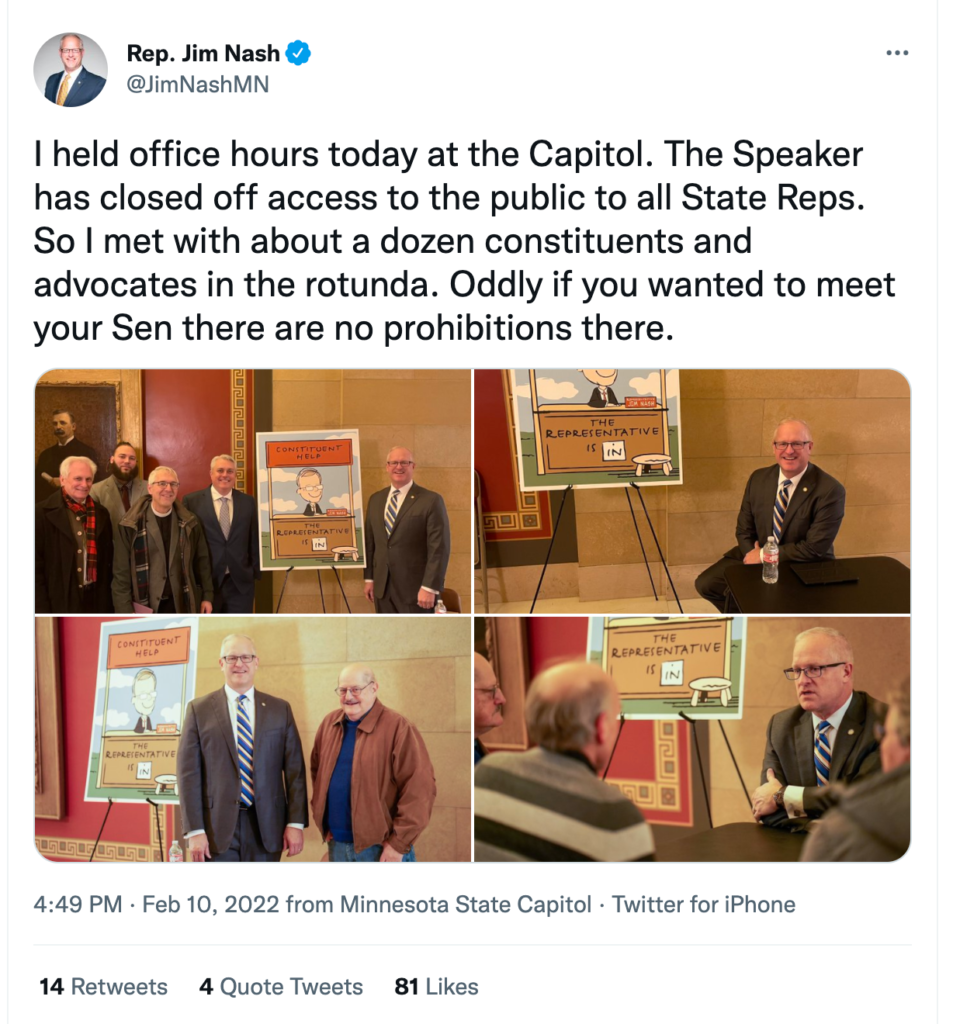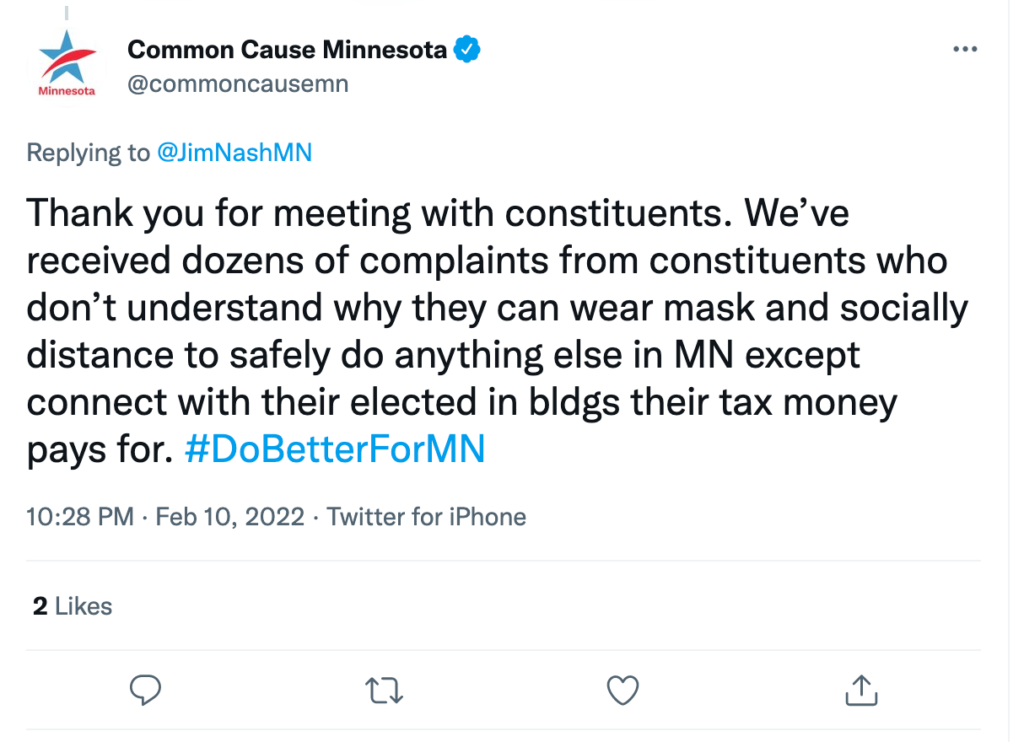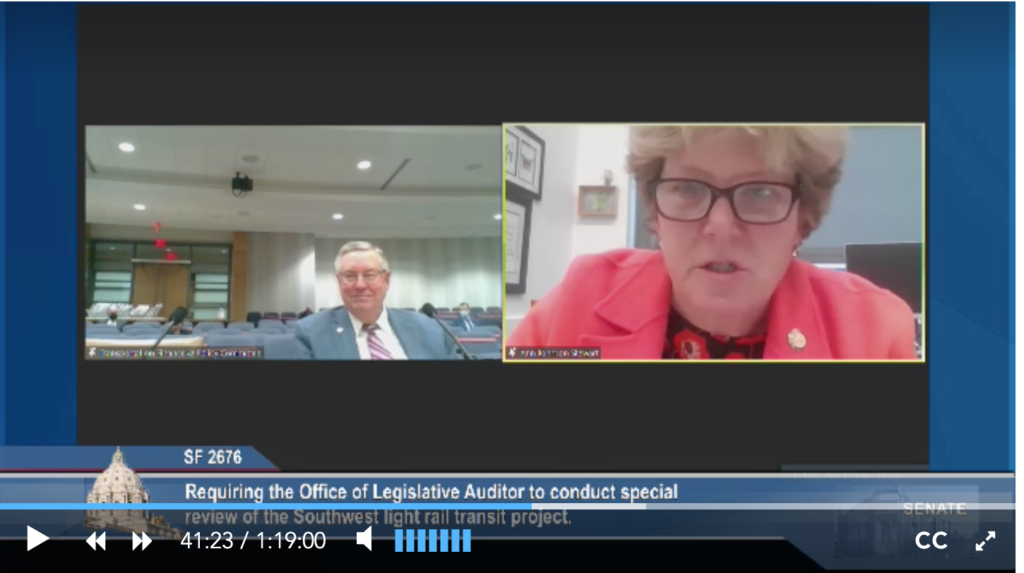Capitol Watch: House still closed for business, redistricting looming
Madam Speaker: Open Up the House
The Minnesota House of Representatives locked the public out of the State Office Building back in March 2020 when the pandemic hit and to this day have not let them back in. Taxpayer supported staff have been working from home for almost two years and the public can’t walk in to visit with their Representative without an appointment, an escort and of course a worthless cloth mask.
Speaker of the House Melissa Hortman is stubbornly keeping the House shut down even as the State Capitol and Senate Office Building are open to the public. She is trading the “safety” of members and staff for the transparency needed in the legislative process. Say what you want about lobbyists and the press, but they also need regular access to members and staff in order for the system to work in a free and open manner. It’s outrageous that House Democrats hide behind COVID safety during the day while the rest of the state is going to Target, school, church and the Wild game.
Representative Jim Nash (R-Waconia) didn’t let Speaker Hortman get in his way as he announced office hours in the hallway of the State Capitol so his constituents could meet with him.

As Rep. Nash pointed out, the Senate is mostly open for business with in-person committee hearings, although you still need an escort to access member offices. Nash found support from an unlikely source — Common Cause Minnesota. This liberal group applauded Nash’s creativity and has been a consistent critic of House Democrats’ lack of transparency.

A Funny Thing Happened on the Way to Transportation Committee
We wrote last year about Sen. Ann Johnson Stewart (DFL-Plymouth) and her conflict of interest serving on the Transportation Committee and supporting transportation spending bills that ultimately pay for consulting contracts for her engineering firm. Johnson Stewart’s company received over $7.6 million in state contracts the last five years, but it didn’t stop her from advocating and voting for the $6.4 billion Transportation Omnibus Spending Bill in 2021.
We called for an investigation, ethics complaint, or at the very least for her to start publicly acknowledging her conflicts. A funny thing happened this week. As talk intensified behind the scenes about Johnson Stewart’s ethical issues, the good Senator suddenly piped up in Transportation Committee and declared a potential conflict of interest over a bill that seeks to investigate the cost overruns of the Southwest Light Rail project.

“Thank you, Mr. Chair. I’d just like to speak on the record that due to a potential conflict of interest, I will not be participating in the consideration of this bill.”
After voting for billions of dollars in transportation funding and serving over a year in the Senate, Johnson Stewart finally thought enough of her constituents to let them know she might have a financial interest in the outcome of pending legislation. A rare small victory for transparency.
Redistricting Maps Released by the Court This Tuesday
Tuesday will be a big day at the State Capitol as the court panel releases redistricting maps for both Congress and the legislature. February 15th is the deadline in state law for the legislature to get their work done. Since that is not going to happen (again), the court will step in and release the plan they have been working on behind closed doors.
The new map kicks off a complicated process of reorganizing local political units for each party. Some things to watch with the new maps:
- What overall approach did the court take with the maps? Traditionally the courts have limited themselves to a “least change” approach in deference to the legislative process. The current court panel adopted the same set of redistricting criteria used the last two decades, but that doesn’t necessarily mean they will adopt a least change map.
- Which incumbent legislators have been paired with each other, causing retirements or head-to-head matchups? Pairings can be between parties but also within parties, causing a lot of potential conflict.
- How many seats will the core cities of Minneapolis and St. Paul have in the new map? Their populations both grew during the last decade relative to the rest of the state so the urban areas should have more power next year. By the way, city populations grew because of increased density, mostly around light rail and bus transportation. This is by design — the DFL has done a masterful job using transportation funding to grow their power over the last three decades.
- How did the court handle regional centers such as Rochester, St. Cloud and Moorhead? Depending on how the lines are drawn, Rochester could be tougher for Republicans to hold while areas like St. Cloud and Moorhead could get harder for Democrats to hold.
Capitol Watch will have complete analysis of the new maps next week.
When all else fails, help restaurants move out of the core cities
This week’s good bill provides relief for restaurants and bars in Minneapolis and St. Paul that have lost business due to the onerous COVID restrictions placed on them by their liberal mayors. Introduced by Sen. Mark Johnson (R-East Grand Forks), SF 2943 provides grants to establishments in the core cities for the costs of relocating their businesses to another part of Minnesota.
Minneapolis and St. Paul just ended a three-week period where bars and restaurants had to check their customer’s vaccination records before they could serve them. Bookings in Minneapolis restaurants are down 59.5% from before the pandemic began, even as Mayor Jacob Frey remains oblivious.
In an extra twist of the knife to Minneapolis and St. Paul, extra priority is given to restaurants or bars is in high-crime areas.
Bad Bill of the Week subsidizes electric vehicles
If you listen to the Left, demand for electric vehicles will change the way we get from Point A to Point B in the near future. It’s only a matter of time. And massive government subsidies.
HF 1668 provides a $2,500 rebate from the state for Minnesota residents and businesses to purchase brand new electric vehicles. The bill also allows energy companies like Xcel and Minnesota Power to raise their rates to recover the cost of building EV charging stations. Once again the little guy is going to pay higher prices for electricity so rich guys can brag about their solar panels and Teslas.
Quote of the Week
“The one thing I do know is police activity is very challenging, especially when you’re trying to arrest a dangerous criminal. There are times when you have to use extreme measures to make their arrest, otherwise the public is in danger.”
– Sen. Warren Limmer
Sen. Warren Limmer (R-Maple Grove) threw cold water on the emotional rush to ban no knock warrants in the aftermath of the death of Amir Locke. As usual, Democrats in the House immediately held hearings on the issue with Gov. Walz signaling his support for a ban.
Limmer did promise a full discussion of the issue this session. The Senate Public Safety Chair and his counterpart in the House would be wise to include the voice of law enforcement as legislation moves forward.
This content was originally shared with subscribers to the Capitol Watch weekly newsletter. Subscribe below.
Subscribe to Capitol Watch
Minnesota political news from an insider’s perspective.